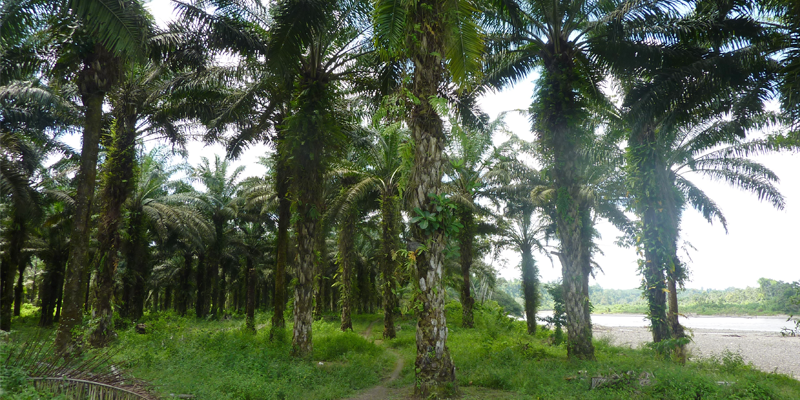By Alice Lucas
Deforestation is the second biggest cause of climate change after fossil fuels, and accounts for 11% of global greenhouse gas emissions.1 With the Environment Bill currently making its way through Parliament – and on the agenda at today’s Queen’s Speech – this is a unique opportunity for the UK government to take a leading role in tackling this damaging practice.
Deforestation is wreaking havoc on the planet and its people: we urgently need to address it. We know that the climate crisis is already having a devastating impact on farmers and workers in low-income countries, many of whom are already living close to the poverty line.
The ongoing destruction of forests hurts producers in two main ways. Firstly, deforestation contributes to the continued release of carbon dioxide into the atmosphere, leading to changing, and more severe, weather conditions. Increased instances of floods, droughts, storms and crop disease are already occurring, making life extremely difficult for communities in climate-vulnerable countries.
We need swift action to make sure that the farmers and workers at the end of our food supply chains, who have done the least to contribute to the climate crisis, are supported to both adapt to, and mitigate against, it.2
Secondly, in the long-run deforestation damages the productivity of the land, and the communities who live on and are dependent on it. Evidence shows that deforested land reduces a community’s access to clean water, for example.3
Tackling deforestation is therefore vital – not only to ensuring the UK meets its commitments under the Paris Climate Agreement, but also in helping smallholder farmers and workers who produce much of the UK’s best-known foods to continue to farm sustainably – which in turn contributes to long-term food security here in the UK.
Why are trees being cut down?
If deforestation is so bad for communities, why does it continue to happen? The answer is, unfortunately, poverty. Deforestation and poverty are intertwined issues that fuel each other, and you can’t address one without the other.
Poverty can fuel deforestation when farmers are caught between letting their family go hungry or cutting down more trees to create room to grow more crops: it is not a fair choice.
At the same time, deforestation fuels poverty – without trees, communities are more vulnerable to the impacts of climate change, it lowers the amount of produce they can produce on the land, affects biodiversity and community water supply.
What’s in the Environment Bill, and how will it help tackle deforestation?
In November 2020, the Government introduced an amendment to the Environment Bill which would introduce laws requiring businesses to make sure that products they imported into the UK weren’t produced on illegally deforested land.
Known as Schedule 16, the amendment introduces measures to tackle the use of certain ‘forest-risk’ commodities, such as cocoa, produced through illegal deforestation and available on the UK market. The legislation would require UK businesses to conduct what is known as ‘due diligence’, to ensure their product does not come from land that is deforested illegally, according to local laws. Businesses would face fines should they fail to comply.
We are pleased to see the introduction of this legislation. If passed, it will be a flagship law that sends a clear signal that the UK Government is serious about ensuring businesses are held accountable for their role in tackling the climate crisis.
However, we are also keen to ensure that any new legislation does not have harmful consequences for the farmers and workers at the end of our supply chains. Since poverty and deforestation are inextricably linked, legislation also needs to promote and encourage investment into communities themselves and the attainment of living wages.
One concern is the lack of a strong link to human rights issues within the proposed laws: this gap creates a real risk that the legislation will fail to address the root causes of deforestation, too. Human rights are vital for understanding and implementing environmental rights: for example, deforestation can often be connected to land grabs by unscrupulous corporations, denying indigenous groups their right to land.
The Environment Bill – a great start, but much more to be done
There is no doubt that this is an important step in the right direction and a landmark piece of legislation. We now hope the Government will adopt both primary and secondary legislation that promotes the meaningful engagement of smallholder farmers and producers, includes human rights,4 and broadens the definition of deforestation to include all forms of deforestation (rather than only that classified as ‘illegal’), to account for circumstances where national law in countries of origin is weak or poorly enforced.
Since we know that poverty and deforestation fuel each other in a negative cycle, we are also keen to see details of the due diligence legislation that includes trading and pricing practices. This would go a long way towards ensuring that the law works in support of living incomes and living wages, incentivises investment at farm level and, ultimately, gives producers on the climate frontline a fairer wage for their work, so they stand a fighting chance of thriving in the face of the crisis.5
References
Ref 1: IPCC AR5 Synthesis report: Climate Change 2014
Ref 3: Mongabay, 2019: Deforestation diminishes access to clean water, study finds.
Ref 4: We support Amendments 26 and 27 introduced by Neil Parish MP, which would strengthen the legislation around the Free, Prior and Informed Consent (FPIC) for Forest Peoples and Indigenous Communities: this would go some way in addressing the lack of human rights as part of the legislation, and the inclusion of financial institutions within the scope. For more, read Global Witness Environment Bill: Briefing for Commons Report (PDF)
